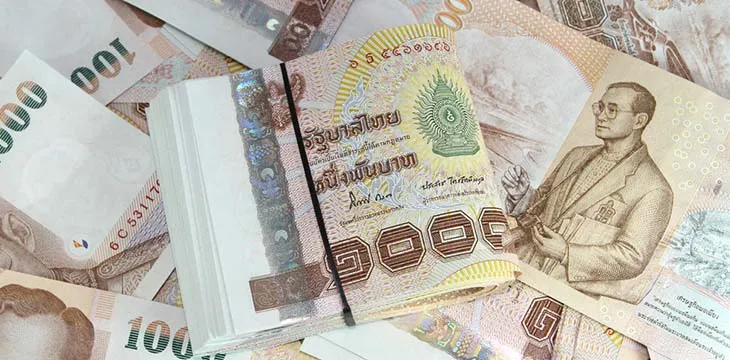|
Getting your Trinity Audio player ready...
|
Thailand’s main opposition party will gift $300 to each citizen above 16 years old if it emerges victorious in the upcoming general elections.
Pheu Thai revealed its election pledges recently, and they include increasing the minimum daily wage to THB600 ($18) and guaranteeing households a minimum monthly income of THB20,000 ($585). It also wants to expand universal healthcare and raise crop prices.
However, it’s a proposal to resort to digital tokens to revamp the economy that has grabbed the headlines. As Bloomberg reports, the party pledged to hand out THB500 billion ($15 billion) to citizens aged 16 and above (55 million people) if it snatches the victory in the elections, slated for mid-May.
The head of the party’s economic policy committee, Prommin Lertsuridej, elaborated that the new government would distribute the token through digital wallets built on the blockchain. These tokens can be spent on goods and services in one’s neighborhood, within a 4-kilometer radius, and within six months.
The idea is radical, but according to Prommin, the Thai economy desperately needs a revamp, and digital tokens might be the best solution.
“You have zero pulse and we have to resuscitate your heart with a shock. We have to use a strong measure,” Prommin said.
One big concern is where the government will get the money to fund the project. Thais are struggling under record household debt, and the country’s economy is lagging behind its peers in the Southeast Asian region.
Prommin stated just over half the amount will come from “additional government revenue” while tax collection and cutting down on “redundant budget allocation” would each contribute THB100 billion ($2.92 billion). The remaining $1.2 billion would come from the prime minister’s discretionary fund.
The $15 billion digital token handout
While Pheu is the first to promise cash distribution through digital assets, the other parties battling out in next month’s election are all promising billions of dollars to the citizens.
The ruling Palang Pracharath party promised THB700 ($21) to 15 million welfare cardholders, while the United Thai Nation Party pledged THB1,000 ($29).
Pheu Thai hopes that turning to a digital token will appeal to the tech-savvy young population that has taken to digital currencies. As per a Chainalysis study, Thailand ranks 8th globally for digital asset adoption.
Paetongtarn Shinawatra, the party’s chief advisor on innovation, says that the project will push the adoption of digital currencies in the kingdom.
While the digital token move could help Pheu Thai sway some swing votes, the party is already in the lead, according to opinion polls. The latest by the National Institute of Development Administration gives Pheu Thai’s Prime Minister candidate Paetongtarn Shinawatra a 38.2% share of the votes. Incumbent PM Prayuth Chan-Ocha trails at a distant 15.7%.
As the opposition party pledges to distribute a digital token, the country’s central bank continues its work on the digital baht. CBDCs have been touted to be an ideal channel to distribute funds to citizens directly from the central banks. In some countries with functional CBDCs, central banks have already distributed welfare to citizens through digital tokens. One of these is Nigeria, where CBN says welfare distribution has played a big role in adopting the eNaira, bringing in over four million new eNaira wallets.
Watch: Loyalty Programs & Blockchain

 06-30-2025
06-30-2025 





